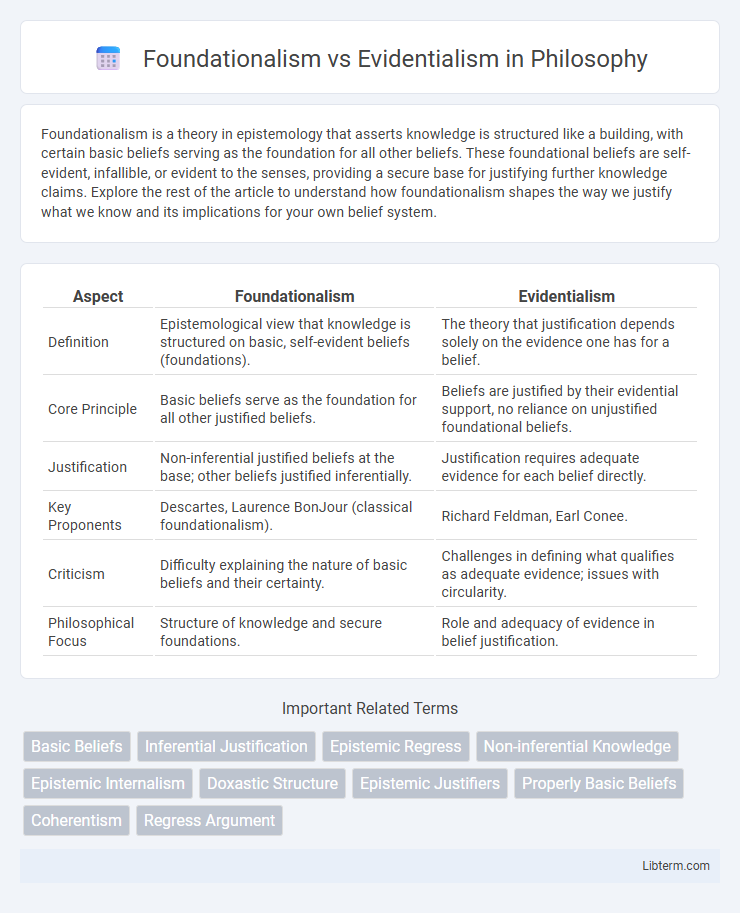Foundationalism is a theory in epistemology that asserts knowledge is structured like a building, with certain basic beliefs serving as the foundation for all other beliefs. These foundational beliefs are self-evident, infallible, or evident to the senses, providing a secure base for justifying further knowledge claims. Explore the rest of the article to understand how foundationalism shapes the way we justify what we know and its implications for your own belief system.
Table of Comparison
| Aspect | Foundationalism | Evidentialism |
|---|---|---|
| Definition | Epistemological view that knowledge is structured on basic, self-evident beliefs (foundations). | The theory that justification depends solely on the evidence one has for a belief. |
| Core Principle | Basic beliefs serve as the foundation for all other justified beliefs. | Beliefs are justified by their evidential support, no reliance on unjustified foundational beliefs. |
| Justification | Non-inferential justified beliefs at the base; other beliefs justified inferentially. | Justification requires adequate evidence for each belief directly. |
| Key Proponents | Descartes, Laurence BonJour (classical foundationalism). | Richard Feldman, Earl Conee. |
| Criticism | Difficulty explaining the nature of basic beliefs and their certainty. | Challenges in defining what qualifies as adequate evidence; issues with circularity. |
| Philosophical Focus | Structure of knowledge and secure foundations. | Role and adequacy of evidence in belief justification. |
Defining Foundationalism
Foundationalism is a theory in epistemology that asserts knowledge is structured like a building, with certain basic beliefs serving as the foundation for all other beliefs. These foundational beliefs are self-evident, infallible, or evident to the senses, providing a secure basis for justified knowledge. This epistemic structure contrasts with Evidentialism, which emphasizes the necessity of evidence for all justified beliefs without privileging basic beliefs.
Understanding Evidentialism
Evidentialism emphasizes that beliefs must be supported by sufficient evidence to be justified, asserting that the evidence directly determines the rational acceptability of a belief. This epistemological theory contrasts with Foundationalism by rejecting the notion of basic beliefs that are justified independently of evidence, instead requiring all beliefs to be evidentially grounded. Key proponents like Richard Feldman argue that evidential support serves as the primary criterion for rational belief, highlighting the role of evidence in the structure of justification.
Historical Origins and Development
Foundationalism originated with Descartes in the 17th century, emphasizing indubitable beliefs as the foundation for knowledge, while evidentialism emerged later, particularly through the works of philosophers like C.I. Lewis and Richard Feldman, advocating that beliefs must be supported by sufficient evidence. The historical development of foundationalism is deeply rooted in rationalist traditions, seeking certainty through self-evident truths and a hierarchical structure of knowledge. Evidentialism developed within the empiricist framework, highlighting the importance of evidence and justification in belief formation and challenging the strict foundationalist approach.
Core Principles of Foundationalism
Foundationalism asserts that knowledge is structured like a building, with certain basic beliefs serving as the secure foundation upon which other beliefs are justified. These foundational beliefs are self-evident, infallible, or evident to the senses, providing indubitable support for further knowledge. Core principles of foundationalism emphasize the epistemic priority of these basic beliefs, minimizing reliance on infinite regress and ensuring a stable base for justified belief systems.
Key Tenets of Evidentialism
Evidentialism asserts that beliefs must be supported by adequate evidence to be justified, emphasizing the primacy of empirical data and logical reasoning. It holds that the justification of a belief is determined solely by the quality and quantity of evidence available, rejecting innate or self-evident beliefs without evidential support. Central to evidentialism is the requirement that justification is an epistemic duty, compelling rational agents to proportion their beliefs according to the evidence.
Major Philosophers and Influences
Foundationalism, championed by philosophers like Rene Descartes and John Locke, asserts that knowledge is built upon indubitable basic beliefs serving as the foundation for all other beliefs. Evidentialism, advocated by thinkers such as Richard Feldman and Earl Conee, emphasizes that the justification of beliefs depends solely on the evidence supporting them. The debate between these epistemological theories has significantly influenced modern discussions on the nature of justification and rational belief formation.
Foundationalism vs Evidentialism: Core Differences
Foundationalism asserts that knowledge is structured on basic, self-evident beliefs forming a foundation for other justified beliefs, whereas Evidentialism demands that all beliefs be supported by sufficient evidence. The core difference lies in Foundationalism's emphasis on indubitable foundational beliefs, while Evidentialism requires proportional evidence for every belief without presupposing any belief as foundational. This distinction shapes debates in epistemology regarding how justification and knowledge are acquired and structured.
Common Criticisms and Debates
Foundationalism faces criticism for potentially creating arbitrary stopping points in justification, where basic beliefs are assumed without further support, leading to questions about their epistemic reliability. Evidentialism is challenged for its strict requirement that all beliefs must be supported by sufficient evidence, which critics argue can be overly demanding and dismiss intuitive or practical knowledge. Debates continue over whether foundational beliefs truly provide a secure epistemic foundation or if evidentialist demands better accommodate the complexities of knowledge acquisition and belief justification.
Practical Applications in Epistemology
Foundationalism and evidentialism yield distinct practical applications in epistemology, influencing how knowledge claims are justified and evaluated. Foundationalism emphasizes basic, self-evident beliefs as the secure groundwork for further knowledge, which is critical in fields like science and law where establishing indubitable premises ensures reliable inference. Evidentialism prioritizes evidence as the sole basis for belief justification, underpinning decision-making processes in areas such as medicine and artificial intelligence by demanding rigorous empirical support before accepting claims.
Contemporary Perspectives and Future Directions
Contemporary perspectives on foundationalism and evidentialism emphasize integrating coherentist elements to address challenges of infinite regress and epistemic justification. Recent debates explore how foundational beliefs can be probabilistically supported, promoting a more nuanced interplay between basic and evidentially derived knowledge. Future directions involve leveraging advancements in cognitive science and artificial intelligence to refine criteria for justification and the role of perceptual experiences in epistemic foundations.
Foundationalism Infographic

 libterm.com
libterm.com